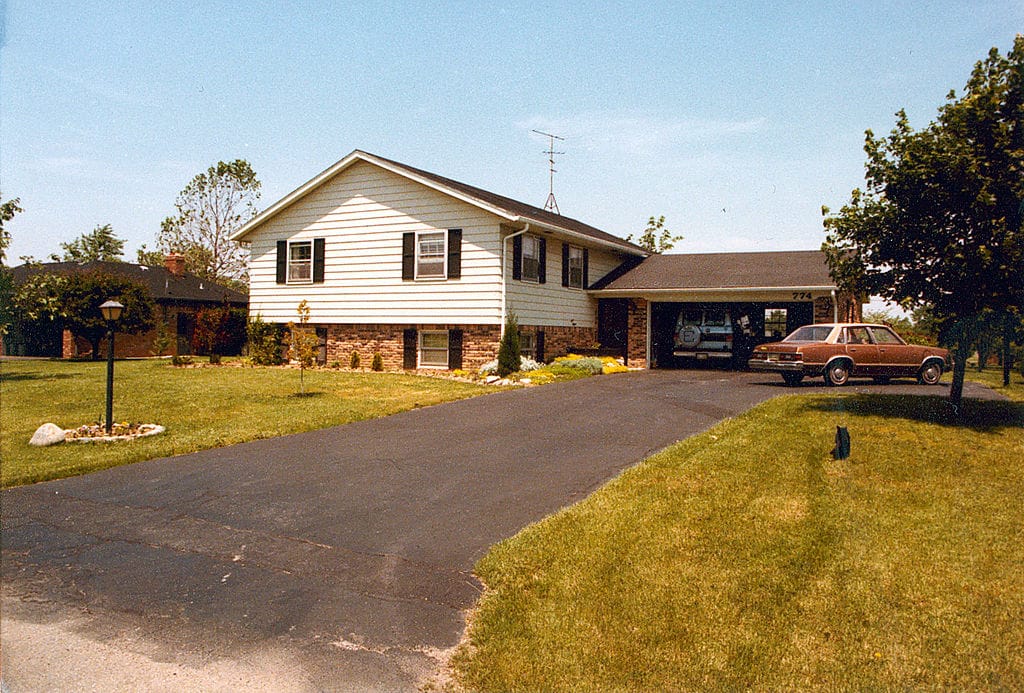yard

In Present-Day English, yard has several meanings, but the two dominant ones are an open area near a house or other building and a unit of linear measure. But while spelled and pronounced the same, these are two separate words, descending from different Old English roots.
The first, the open area near a building, comes from the Old English geard, meaning a home, dwelling place, or enclosure. And it is from this enclosure sense that the present-day meaning comes down to us. We see this sense in the poem Beowulf, in a passage in which an old man mourns the death of his son:
Gesyhð sorhcearig on his sune bure
winsele westne, windge reste,
reot[g]e berofene; ridend swefað,
hæleð in hoðman; nis þær hearpan sweg,
gomen in geardum, swylce ðær iu wæron.
(He will look sadly at his son’s chamber, the desolate wine-hall, the windswept rest, mournful, empty; the riders sleep, heroes in the grave; there is no harp song, no entertainments in the yard, such as there once was.)
And we see it used in the sense of home, rather figuratively to refer to heaven, in the poem Guthlac A:
Swa soð-fæstra sawla motun
in ecne geard up gestigan
rodera rice, þa þe ræfnað her
wordum ond weorcum wuldor-cyninges
lare longsume, on hyra lifes tid
earniað on eorðan ecan lifes,
hames in heahþu.
(So may the souls of the righteous ascend to the eternal yard, the kingdom of heaven; those who perform here in words and deeds the longtime teaching of the king of glory in their lifetimes on earth earn eternal life, homes on high.)
The unit of measurement, on the other hand, comes from the Old English gyrd, meaning a tree branch, rod, or staff. We see this rod sense in the Old English translation of Exodus 8:16:
Drihten cwæð to Moyse: Cweð to Aarone: Ahefe þine gyrde & sleah on eorðan, þæt gnættas gewurðon ofer eal Egypta land.
(The Lord said to Moses: Say to Aaron, “raise your yard & strike the earth, so that gnats settle over all the land of Egypt.)
And gyrd as the unit of measurement can be seen in a charter that outlines the rents due at Hurstbourne Priors, Hampshire:
Her synd gewriten þa gerihta þæ ða ceorlas sculan don to Hyssebyrnan. Ærest æt hilcan hiwisce feorwerti penega to herfestes emnihte […] & XVI. gyrda gauoltininga eac.
(Here are written the dues the peasants must render at Hurstbourne. First, from each hide fourteen pence at the autumnal equinox […] & also 16 yards of fencing.)
This Old English yard was not equivalent to our present-day measurement, being around sixteen feet long—the modern measure known as a rod is sixteen and a half feet. So a more accurate present-day translation of the above would read “16 rods of fencing.” The yard was reduced and standardized at three feet in the fourteenth century.
Sources:
Crawford, S. J., ed. The Old English Version of the Heptateuch. Early English Text Society, O. S. 160. London: Oxford UP, 1922, Exodus 8:16, 232. Archive.org.
Dictionary of Old English: A to Le, 2024, s.v. geard, n., gyrd, n.
Fulk, R. D. Robert E. Bjork, and John D. Niles. Klaeber’s Beowulf, fourth edition. Toronto: Toronto UP, 2008, lines 2455–59, 84.
Guthlac A. In Mary Clayton, ed. Old English Poems of Christ and His Saints. Dumbarton Oaks Medieval Library 27. Cambridge: Harvard UP, 2013, lines 790–96a, 142.
Oxford English Dictionary, second edition, 1989, s.v. yard, n.1, yard, n.2.
“Services and Dues Rendered at Hurstbourne Priors, Hampshire.” In A. J. Robertson, ed. Anglo-Saxon Charters, second edition. Cambridge: Cambridge UP, 1959, 206.
Image credit: Bart Everson, c. 1983. Wikimedia Commons. Licensed under a Creative Commons Attribution 2.0 Generic license.